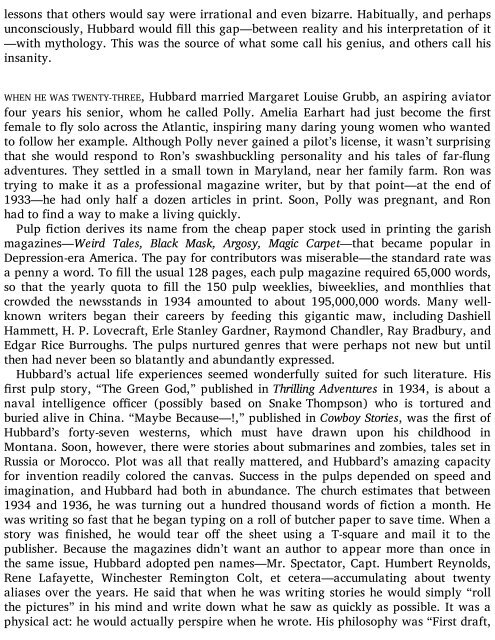going-clear-scientology-hollywood-and-the-prison-of-belief-by-lawrence-wright-2
going-clear-scientology-hollywood-and-the-prison-of-belief-by-lawrence-wright-2
going-clear-scientology-hollywood-and-the-prison-of-belief-by-lawrence-wright-2
You also want an ePaper? Increase the reach of your titles
YUMPU automatically turns print PDFs into web optimized ePapers that Google loves.
lessons that o<strong>the</strong>rs would say were irrational <strong>and</strong> even bizarre. Habitually, <strong>and</strong> perhaps<br />
unconsciously, Hubbard would ll this gap—between reality <strong>and</strong> his interpretation <strong>of</strong> it<br />
—with mythology. This was <strong>the</strong> source <strong>of</strong> what some call his genius, <strong>and</strong> o<strong>the</strong>rs call his<br />
insanity.<br />
WHEN HE WAS TWENTY-THREE, Hubbard married Margaret Louise Grubb, an aspiring aviator<br />
four years his senior, whom he called Polly. Amelia Earhart had just become <strong>the</strong> rst<br />
female to y solo across <strong>the</strong> Atlantic, inspiring many daring young women who wanted<br />
to follow her example. Although Polly never gained a pilot’s license, it wasn’t surprising<br />
that she would respond to Ron’s swashbuckling personality <strong>and</strong> his tales <strong>of</strong> far-ung<br />
adventures. They settled in a small town in Maryl<strong>and</strong>, near her family farm. Ron was<br />
trying to make it as a pr<strong>of</strong>essional magazine writer, but <strong>by</strong> that point—at <strong>the</strong> end <strong>of</strong><br />
1933—he had only half a dozen articles in print. Soon, Polly was pregnant, <strong>and</strong> Ron<br />
had to find a way to make a living quickly.<br />
Pulp ction derives its name from <strong>the</strong> cheap paper stock used in printing <strong>the</strong> garish<br />
magazines—Weird Tales, Black Mask, Argosy, Magic Carpet—that became popular in<br />
Depression-era America. The pay for contributors was miserable—<strong>the</strong> st<strong>and</strong>ard rate was<br />
a penny a word. To ll <strong>the</strong> usual 128 pages, each pulp magazine required 65,000 words,<br />
so that <strong>the</strong> yearly quota to ll <strong>the</strong> 150 pulp weeklies, biweeklies, <strong>and</strong> monthlies that<br />
crowded <strong>the</strong> newsst<strong>and</strong>s in 1934 amounted to about 195,000,000 words. Many wellknown<br />
writers began <strong>the</strong>ir careers <strong>by</strong> feeding this gigantic maw, including Dashiell<br />
Hammett, H. P. Lovecraft, Erle Stanley Gardner, Raymond Ch<strong>and</strong>ler, Ray Bradbury, <strong>and</strong><br />
Edgar Rice Burroughs. The pulps nurtured genres that were perhaps not new but until<br />
<strong>the</strong>n had never been so blatantly <strong>and</strong> abundantly expressed.<br />
Hubbard’s actual life experiences seemed wonderfully suited for such literature. His<br />
rst pulp story, “The Green God,” published in Thrilling Adventures in 1934, is about a<br />
naval intelligence ocer (possibly based on Snake Thompson) who is tortured <strong>and</strong><br />
buried alive in China. “Maybe Because—!,” published in Cowboy Stories, was <strong>the</strong> rst <strong>of</strong><br />
Hubbard’s forty-seven westerns, which must have drawn upon his childhood in<br />
Montana. Soon, however, <strong>the</strong>re were stories about submarines <strong>and</strong> zombies, tales set in<br />
Russia or Morocco. Plot was all that really mattered, <strong>and</strong> Hubbard’s amazing capacity<br />
for invention readily colored <strong>the</strong> canvas. Success in <strong>the</strong> pulps depended on speed <strong>and</strong><br />
imagination, <strong>and</strong> Hubbard had both in abundance. The church estimates that between<br />
1934 <strong>and</strong> 1936, he was turning out a hundred thous<strong>and</strong> words <strong>of</strong> ction a month. He<br />
was writing so fast that he began typing on a roll <strong>of</strong> butcher paper to save time. When a<br />
story was nished, he would tear o <strong>the</strong> sheet using a T-square <strong>and</strong> mail it to <strong>the</strong><br />
publisher. Because <strong>the</strong> magazines didn’t want an author to appear more than once in<br />
<strong>the</strong> same issue, Hubbard adopted pen names—Mr. Spectator, Capt. Humbert Reynolds,<br />
Rene Lafayette, Winchester Remington Colt, et cetera—accumulating about twenty<br />
aliases over <strong>the</strong> years. He said that when he was writing stories he would simply “roll<br />
<strong>the</strong> pictures” in his mind <strong>and</strong> write down what he saw as quickly as possible. It was a<br />
physical act: he would actually perspire when he wrote. His philosophy was “First draft,


